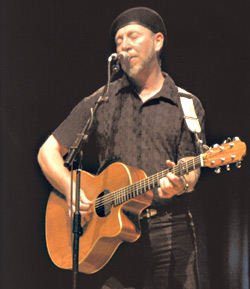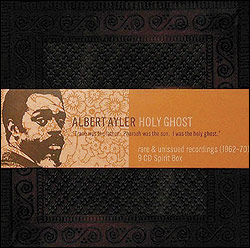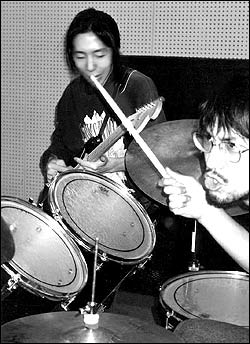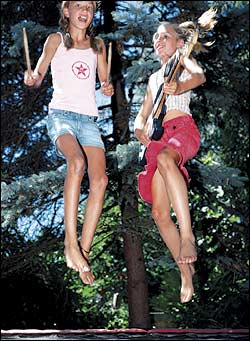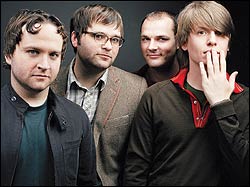The last time Richard Thompson was the subject of a boxed set was 13 years ago: a three-disc compilation on Rykodisc called Watching the Dark. This time, the British folk label Free Reed (which put together a superb boxed set of Thompson’s old band Fairport Convention a few years ago) has assembled RT: The Life and Music of Richard Thompson—five discs, plus a 168-page book and a bonus disc you have to write in for, featuring Thompson appearances from their other releases and a handful of Thompson covers.
Boxed sets have a strange and burdensome responsibility, like a museum’s single-artist retrospective: They can’t just be an example or a collection of a musician’s work, they have to represent the essence of what that artist is or means. On top of that, there’s the issue of whether they’re meant for the unconverted or the faithful. Watching the Dark was basically an introduction to Thompson’s oeuvre, with a bunch of live recordings and oddities thrown in for longtime fans. RT, though, is unabashedly a fan’s box. The compilers have included virtually nothing that’s been officially released before, so apart from a handful of studio outtakes, it’s skewed very heavily toward live recordings.
That’s not a bad move. The conventional wisdom about Thompson’s career is that he’s at his best on a stage, and he has never had more than marginal success selling records. Appropriately, the first song on RT is a cover of “Now That I Am Dead,” a song by John French and Donna Blair about how death is the best career move a pop musician can make. (It’s tastefully separated by a few discs from Thompson’s cover of the late Nick Drake’s “Time Has Told Me”; he played on the original singers’ versions of both songs, too.)
The new box is scrambled chronologically and arranged by theme. One disc is songs about real and personal history—a catchall category for a songwriter who’s deeply interested in the past and relentlessly oblique about the real-life drama he can’t stop alluding to anyway. Another is effectively a greatest hits, with repertoire picked by his hard-core fans and recordings made between 1979 and 2005. A lot of his best-loved songs are from the past decade, which is unusual for someone who’s been recording as long as he has; it’s also a sign of both Thompson’s perversity about what he releases and his fans’ love of the obscure that one of the songs that made the best-of list is a previously unreleased 1988 studio outtake, “Push and Shove,” known only through bootlegs.
Even so, the “rare songs” disc is slightly scanty, at 41 minutes—given how many times Thompson’s been the subject of retrospectives, from 1976’s (guitar, vocal) onward, most of the worthwhile leftovers have already been picked up elsewhere. Unsurprisingly, the two best rarities are both from the last few years; the surprise is that they’re both children’s songs, “Alexander Graham Bell” and “My Daddy Is a Mummy.” (This from the man who once wrote the most depressing song to a child ever, “End of the Rainbow”: “There’s nothing at the end of the rainbow/There’s nothing to grow up for anymore.”) There’s also a half-annoying, half-amusing 2004 trifle called “Dear Janet Jackson,” which is about exactly what you think it’s about.
The real treats for the faithful on RT are on two discs distilling regular highlights of his live performances. “The Songs Pour Down Like Silver” is devoted to his covers of other people’s songs—the “1000 Years of Popular Music” project that he toured and recorded a few years ago (in which he played his favorite songs from the last millennium) is represented by a few songs, but we also get caught-on-the-fly versions of the Who’s “Substitute” (twice!), music-hall ukulele king George Formby’s “Why Don’t Women Like Me?,” and a rocked-up “Danny Boy.” He’s got enough gravitas that he makes Britney Spears’ “Oops! I Did It Again” sound like a cruel, bitter song, and enough of a sense of humor that it occurred to him to sing it in the first place.
Of course, there’s the problem that one or two clever, unexpected Thompson covers are totally fun; a dozen or more in a row are overkill. Likewise, not many guitarists can get away with extended soloing the way Thompson can, and when he does, it’s usually a peak of his shows. But the disc with 11 “epic live workouts” is too many of the same kind of peak—it’s got some superb music on it, especially a startling 1991 recording of “Night Comes In” backed up by Fairport Convention, but it’s exhausting in its entirety.
The same goes for the box as a whole. Put any of its discs on shuffle play with other people’s CDs, and Thompson sounds like a genius; play the whole set straight through, and it’s insufferable. As its subtitle suggests, RT tries to represent Thompson’s life, and the whole arc of his public history, as much as his music. That’s a service to his most ardent fans, but for everyone else, it’s one more barrier blocking off an artist who’s too carefully guarded by his cult of admirers.
